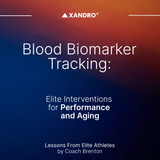Lessons from Elite Sport: Joints and Nutrition, The Keys to Aging Well
23rd Oct 2025
When we watch elite athletes perform, we’re often dazzled by speed, skill, or strength. What we don’t see is the deep strategy behind how they protect their bodies and sustain careers under relentless pressure.
In my 25 years of coaching across tennis, cycling, and multiple professional sports, I’ve learned that the athletes who last aren’t always the most gifted; the
…
Microdosing Exercise: Borrowing From Elite Sport for Lifelong Mobility
15th Oct 2025
As a performance coach for over two decades, I have often observed a powerful yet underappreciated truth: mobility and resilience are usually developed not through long, strenuous workouts, but through consistent, small actions.
In the world of sports, microdosing movement (brief, high-frequency activities) keeps athletes agile, alert, and less prone to injury. It’s time to apply this
…
Blood Biomarker Tracking: Elite Interventions for Performance and Aging
15th Oct 2025
As a performance coach with over twenty years of experience working with top athletes internationally, I’ve seen how small insights can lead to big changes in performance.
One of the key tools that athletes use is tracking their blood health. Instead of just looking at how much they train, teams analyze detailed lab results to help athletes recover better, avoid injuries, and stay at t
…
The Zone and Longevity: How Flow States Can Help Us Age Better
13th Oct 2025
For over twenty years, I've had the privilege of coaching top athletes, from national teams in Australia and Japan, to entrepreneurs focused on living longer, healthier lives.
One thing I've noticed is that the most successful people aren't just physically fit; they are also incredibly skilled at managing their minds.
The key to this? The flow state. (Often described as being "in the z
…
Cognitive Load and Burnout: What Elite Athletes Reveal About Brain Longevity
13th Oct 2025
Throughout my 25-year career coaching top athletes and working with high-performance programs, I discovered a key insight: our bodies can only perform as well as our nervous systems allow.
Even athletes who seem fit can struggle because their nervous systems (the part of us that manages stress, recovery, and mental pressure) can become overwhelmed. This same issue contributes to burnout in t
…




